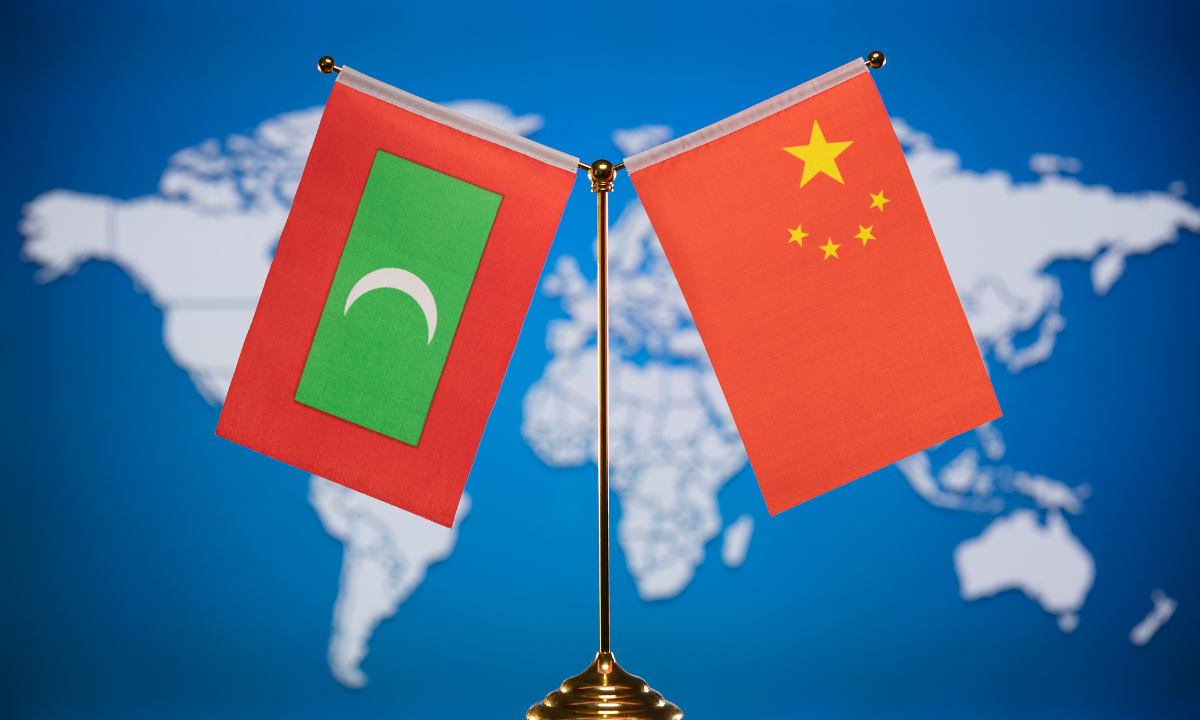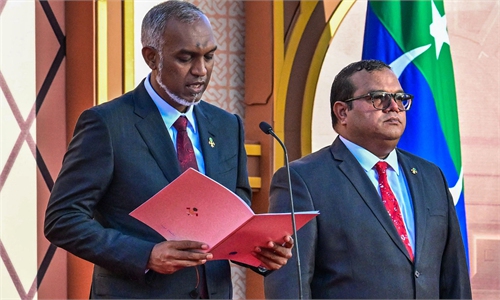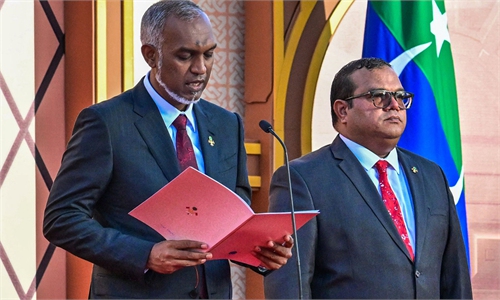Maldivian President Muizzu to pay first state visit to China
India urged to abandon Cold War mentality when assessing China’s cooperation with South Asian nations

China-Maldives relations. Photo: VCG
Maldivian President Mohamed Muizzu is set to embark on his first state visit to China next week, with great expectations of bolstering pragmatic cooperation between the two nations, particularly within the framework of the Belt and Road Initiative. While India is closely monitoring this visit, analysts have urged it to refrain from adopting a zero-sum mind-set or Cold War mentality when assessing China's collaborations with South Asian countries.
At the invitation of Chinese President Xi Jinping, President Muizzu will pay a state visit to China from January 8 to 12, Chinese Foreign Ministry spokesperson Hua Chunying announced on Friday.
This visit is President Muizzu's first state visit to a foreign country since he took office. President Xi will hold a welcome ceremony and banquet for President Muizzu and the two heads of state will hold formal talks and jointly attend the signing ceremony of cooperation documents, Foreign Ministry spokesperson Wang Wenbin told a press conference on Friday.
Chinese Premier Li Qiang and Zhao Leji, chairman of the National People's Congress Standing Committee, will also meet with President Muizzu, according to Wang.
The spokesperson noted that over the past 10 years, China-Maldives relations have developed deeply, the two sides have achieved fruitful results in jointly building the Belt and Road Initiative (BRI) and practical cooperation in various fields, and the traditional friendship between the two countries has continued to deepen.
"Currently, China-Maldives relations stand at a new historical starting point. I believe that through this visit, the two heads of state will make strategic plans for the development of China-Maldives relations and push bilateral relations to a new level," said Wang.
This visit to China highlights Muizzu's willingness to strengthen practical cooperation with China, particularly in docking the Maldives' national development strategy with China's BRI, Qian Feng, director of the research department at the National Strategy Institute at Tsinghua University, told the Global Times on Friday.
As the former minister of Housing and Infrastructure and former mayor of Malé City, Muizzu has witnessed the substantial changes brought by the BRI projects to local residents in the Maldives, and he is a participant as well as an advocate for more concrete cooperation between the two countries, said Qian, noting that during Muizzu's visit, the two sides are also expected to sign documents on the economy, people-to-people exchanges and climate change.
Indian media has been closely monitoring information on Muizzu's journey to China even before China's formal announcement on Friday, noting that he will be the first democratically elected president of the Maldives to visit China before India.
They also noted that since the introduction of multiparty democracy in 2008, every Maldivian president has chosen India as their first destination after assuming office, making Muizzu's decision to defy this "tradition" noteworthy. Following his inauguration in November, Muizzu paid an official visit to Turkey and also attended the COP28 summit in Dubai.
After the presidential election in the Maldives, certain Western and Indian media outlets depicted Muizzu's victory as "a blow to India." Qian noted that the US and the West are keen on witnessing rivalry between India and China, as it could potentially provide them with additional chances to seek geopolitical advantages.
It is crucial to understand that Muizzu's foreign policy should not be perceived as "pro-China" or favoring any specific nation, as his amicable stance toward China is founded on the tangible accomplishments of bilateral collaboration, according to the expert.
Some Indian media labeled Muizzu as a "pro-China" president, but whoever is elected president of Maldives serves the interests of the country, and Maldives will not tilt against India and toward China. As a small country, Maldives hopes to cooperate with India, China, and all other countries in the world, Long Xingchun, a professor at the School of International Relations at Sichuan International Studies University, told the Global Times.
However, India sees South Asia as its sphere of influence and shows little respect for some countries' sovereignty. It wants to exclude other countries, especially China, from developing friendly and cooperative relations with Maldives, said Long.
Viewing itself as the regional boss is also the underlying reason for India's strained relations with some countries in South Asia, Qian said.
Moreover, some forces within India still view the development of China's relations with countries like the Maldives in South Asia as a "zero-sum game" between China and India. They believe that China's strengthened cooperation with other countries in India's "backyard" represents the loss of India's traditional influence, and this kind of Cold War mentality is outdated and highlights the narrow-mindedness of some Indian politicians and media.
India should adopt a more open-minded approach to China's cooperation with other Asian countries, said Qian.



